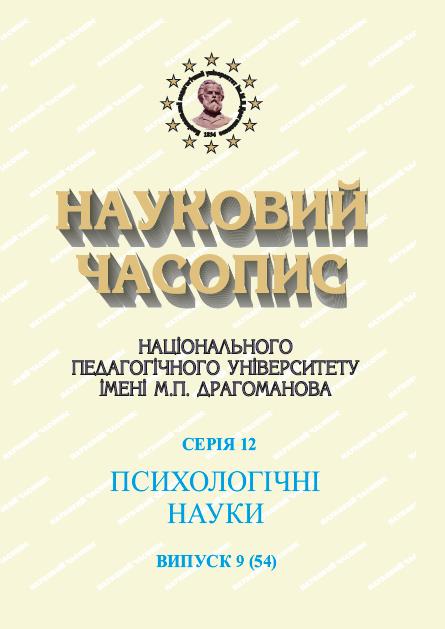PSYCHOLOGICAL FEATURES OF THE SELF-IMAGE OF THE PREGNANT
DOI:
https://doi.org/10.31392/NPU-nc.series12.2020.9(54).15Keywords:
self image, self-consciousness, self-esteem, self-alignment, identity.Abstract
The article is devoted to the study of psychological peculiarities of the self-image of pregnant women who are on different terms of pregnancy. Self-image has been considered as a personal setting for oneself, a complex structured and dynamic personality formation. Cognitive, emotional-evaluative, behavioral, social-perceptual aspects have been defined in the structure of self-image, and their functions have been installed. It has been indicated that the formation of self-image takes place during the life. During pregnancy it is transformed significantly from the image «I am pregnant» to the image «I am a mother» and then – «The child and I». The psychological side of changes of pregnant women identity has been considered. As a result of the research, the peculiarities of the emotional-evaluative aspect of the self-image of pregnant women have been identified. The following features have been revealed: expressed positive selfesteem and self-confidence; average level of self-esteem, auto sympathy and self-acceptance; most pregnant women showed self-consistency, self-interest, and low levels of self-blame. A high level of self-esteem of pregnant women’s health, physical appearance, and self-confidence, adequate assessment of reason, ability, character and overall self-esteem have been ascertained. In the range of social-perceptual aspect, it has been found that the most pronounced characteristics are the middle and low rates of attitude assessment, personal identity, and emotionally-positive form of gender designation. It has been stated that for most pregnant women, sexual role, educational and professional roles are not important at this time, but family affiliation is of a great importance. Within the cognitive aspect, it has been found that women with an emotionally polar personality type, a high level of reflection, positive identification characteristics, a pronounced family and personal perspective predominated among pregnant women. Family sphere and the physical image have been of the greatest importance for the most respondents. Within the behavioral aspect of all respondents, the ability to concentrate on oneself, restraint, prudence, diplomacy, the ability to work with one’s tension, and maintain emotional stability have been diagnosed. Feeling of security, confidence, low levels of anxiety, hostility and conflict of most subjects have been found.
References
- Aftimichuk, O.E. (2012). Predposylki stanovlenija social'noj identichnosti lichnosti beremennoj zhenshhiny v uslovijah fitnesa [Background of the formation of social identity of a pregnant woman in fitness conditions]. Zdorov'e dlja vseh – Health for all, 2, 21- 27 Retrieved from http://ojs.polessu.by/ZdV/article/view/414 [in Russian].
- Belogaj, K.N. (2013). Telesnost' zhenshhiny v svjazi s realizaciej reproduktivnoj funkcii. [Female corporality in connection with reproductive function]. Vestnik Kemerovskogo gosudarstvennogo universiteta – Bulletin of Kemerovo State University, 2–1, 137-142. Retrieved from https://vestnik.kemsu.ru/jour/article/view/86/0 [in Russian].
- Borovikova, N.V. (1998). Psihologicheskie aspekty transformacii Ja-koncepcii beremennoj zhenshhiny [Psychological aspects of the transformation of the self-concept of a pregnant woman]. Proceedings from PPNRD ’98: Konferencija «Perenatal'naja psihologija i nervno-psihicheskoe razvitie detej» – Conference «Transnational Psychology and Neuropsychic Development of Children» (Saint Petersburg, 27-th, may 1998) (pp. 7-8). Saint Petersburg : Saint Petersburg University [in Russian].
- Vasil'eva, E.V. (2008). Osobennosti social'noj identichnosti beremennyh zhenshhin s razlichnym materinskim otnosheniem k detjam [Features of the social identity of pregnant women with different maternal attitudes towards children]. Izvestija Samarskogo nauchnogo centra Rossijskoj akademii nauk. Vypusk «Pedagogika i psihologija», «Filologija i iskusstvovedenie» – Bulletin of the Samara Scientific Center of the Russian Academy of Sciences. Issue «Pedagogy and Psychology», «Philology and Art History», 1, 134–141 Retrieved from http://www.ssc.smr.ru/izv_2008_6.html [in Russian].
- Tihonovich, O.V. (2008). Issledovanie Ja-obraza: metodologicheskie i metodicheskie problemy [Research of the self-image: methodological and methodological problems]. Psihologicheskij zhurnal – Psychological Journal, 1(17), 73-77 Retrieved from http://elibrary.miu.by/journals!/item.pj/issue.17/article.12.phtml [in Russian].
- Alpers, (2001). The changing self-concept of pregnant and parenting teens. Journal of Professional Nursing, 14(2), 111-118. https://doi.org/10.1016/s8755-7223(98)80039-2
- Breen, A.V., & McLean, K.C. (2010). Constructing resilience: Adolescent motherhood and the process of self-transformation. In K.C. McLean & M. Pasupathi (Eds.), Advancing responsible adolescent development. Narrative development in adolescence: Creating the storied self (pр. 151-168). New York : Springer Science, Business Media. https://doi.org/10.1007/978-0-387-89825-4_8
- Kamysheva, E., Skouteris, H., Wertheim, E.H, Paxton, S.J., & Milgrom, J. (2008). Examination of a multi-factorial model of body-related experiences during pregnancy: the relationship among physical symptoms, sleep quality, depression, self-esteem, and negative body attitudes. Body Image, 5(2), 152-163 https://doi.org/10.1016/j.bodyim.2007.12.005
- Liabsuetrakul, T., Vittayanont, A., & Pitanupong, J. (2007). Clinical applications of anxiety, social support, stressors, and self-esteem meaured during pregnancy and postpartum for screening postpartum depression in Thai women. Journal of Obstetrics and Gynaecology Research, 33(3), 333- 340 https://doi.org/10.1111/j.1447-0756.2007.00532.x
- Macola, L., Nogueira, I., & Carmona, E. (2010). Assessment of self-esteem in pregnant women using Rosenberg’s self-esteem. Revista da Escola de Enfermagem daUSP, 44(3), 570- 577 https://doi.org/10.1590/s0080-62342010000300004
- McLean, K.C., & Thorne, A. (2006). Identity light: Entertainment stories as a vehicle for self-development. In P. McAdams, R. Josselson, & A. Lieblich (Eds.), Identity and Story: Creating Self in Narrative (pp. 111-127). American Psychological Association. https://psycnet.apa.org/doi/10.1037/11414-005
- Paff Ogle, J., Tyner, K., & Schofield-Tomschin, S. (2013). The role of maternity dress consumption in shaping the self and identity during the liminal transition of pregnancy. Journal of Consumer Culture, 13(2), 119- 139 doi:10.1177/1469540513480161
- Sieger, K., & Renk, K. (2007). Pregnant and parenting adolescents: A study of ethnic identity, emotional and behavioral functioning, child characteristics, and social support. Journal of Youth and Adolescence, 36(4), 567-581 https://psycnet.apa.org/doi/10.1007/s10964-007-9182-6
- Skouteris, H., Carr, R., Wertheim, E.H, Paxton, S.J., & Duncombe, D.A. (2005). A рrospective study of factors that lead to body dissatisfaction during pregnancy. Body Image, 2(4), 347-361. https://doi.org/10.1016/j.bodyim.2005.09.002

